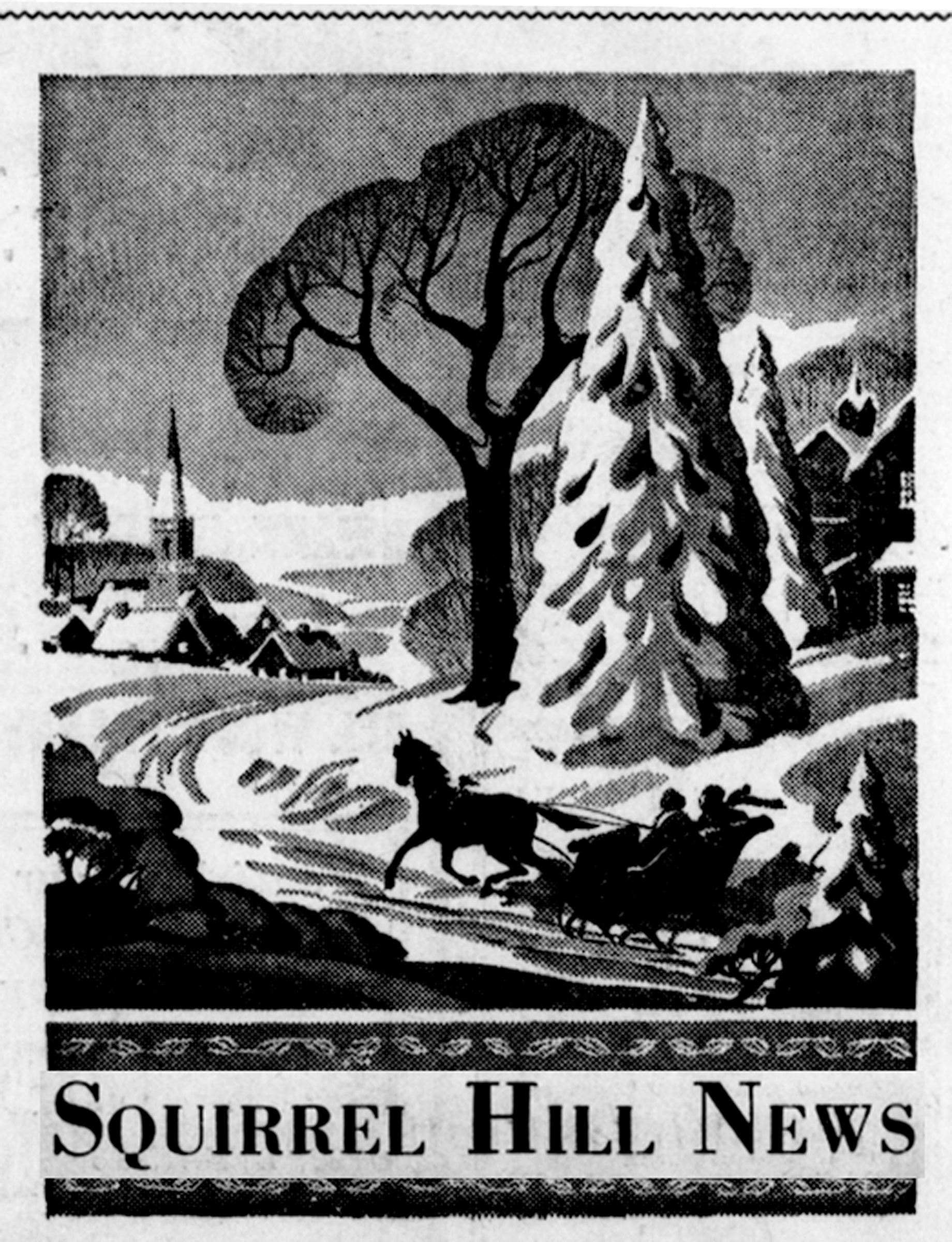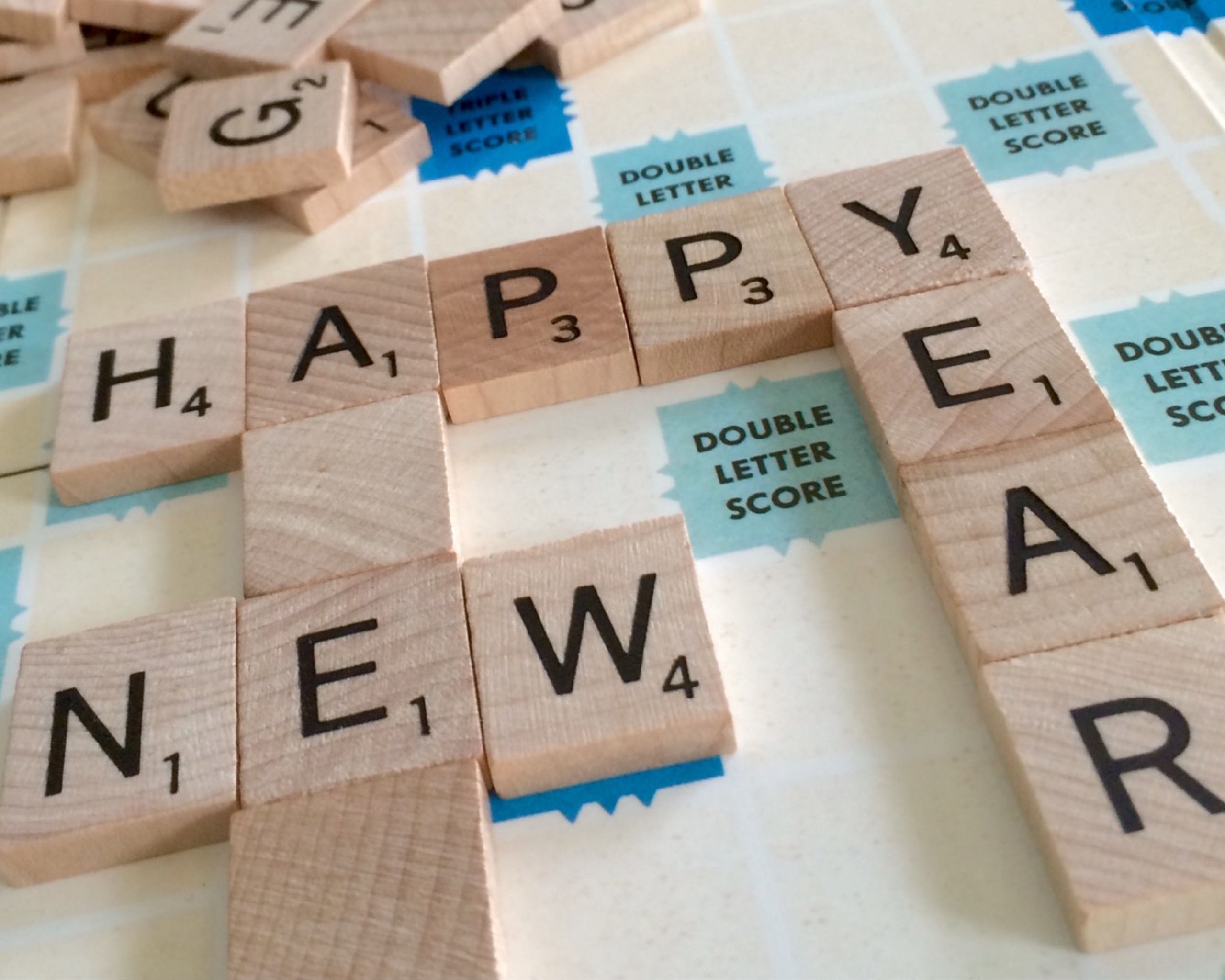Recycling Changes in Pittsburgh
By Helen Wilson
Vice President, Squirrel Hill Historical Society
Celebrations are passed down from generation to generation. “We
 By Helen Wilson
By Helen Wilson
Vice President, Squirrel Hill Historical Society
Celebrations are passed down from generation to generation. “We have always done it this way,” people say. But they didn’t.
The way people did things in colonial times changed as time passed. Customs brought by immigrants changed as well when they were transplanted to the New World. Later generations reinvented them further to suit their own conditions.
For instance, take the illustration for this article. It’s from the Squirrel Hill News, December 23, 1941. It’s doubtful that few, if anyone, in Squirrel Hill had a sleigh by then, but the image lingered because in the past, people did use sleighs to get around in winter. In Right Here in Squirrel Hill, a humorous book written in 1953 about Squirrel Hill’s early days, Hodge MacIlvain Eagleson relates what happened when a young woman “who looked like her veins held angel blood” began to play the piano in a small Squirrel Hill church in the 1850s: “Attendance picked up right away. Charles Andre, for one, never missed. He sat every week in church praying it would snow before next Sunday, so that he could bring sweet Mary Jane to church in his sleigh.” A sleigh was a good thing to have on rutted, unpaved country lanes when it snowed in winter.
By the late 1800s, as Squirrel Hill was becoming an upscale residential neighborhood, sleigh riding had taken on a more festive aspect. Squirrel Hill researcher Wayne Bossinger discovered that after Beechwood Boulevard was constructed around 1898, its wide, sweeping curves became a favorite place to sleigh ride. Wayne found an article in the Pittsburgh Daily Post that said, “it was not unusual to have more than 100 sleighs gliding along.” Naturally, impromptu races occurred, which were so much fun that the races became a festive annual event that attracted large crowds.
The onset of the automobile age in the early 1900s ended the sleigh-riding era, but the nostalgia remained.
Squirrel Hill’s many festivals, of course, didn’t originate in the neighborhood but were brought in by the people who moved there. Most, but not all, of the celebrations had their beginnings as markers for the change of seasons during the course of the year. Survival depended on knowing when to plant and when to harvest, and festivals marked those times.
 New Years Day was a holiday celebrated on different dates depending on culture. There is no break in the continuity of the earth’s trip around the sun to mark the beginning of the year, so each culture chose its own day to celebrate it. The decision wasn’t arbitrary. Rosh Hashanah, the Jewish New Year, is celebrated in autumn at the end of one agricultural cycle and the beginning of the next. The beginning of the Christian liturgical year is the first Sunday in Advent, four Sundays before Christmas—the time when light was returning to the world after the winter solstice. Unlike other New Year holidays, January 1 was political rather than seasonal. It was designated as New Year’s Day by Julius Caesar when he rearranged the calendar back in 46 BC.
New Years Day was a holiday celebrated on different dates depending on culture. There is no break in the continuity of the earth’s trip around the sun to mark the beginning of the year, so each culture chose its own day to celebrate it. The decision wasn’t arbitrary. Rosh Hashanah, the Jewish New Year, is celebrated in autumn at the end of one agricultural cycle and the beginning of the next. The beginning of the Christian liturgical year is the first Sunday in Advent, four Sundays before Christmas—the time when light was returning to the world after the winter solstice. Unlike other New Year holidays, January 1 was political rather than seasonal. It was designated as New Year’s Day by Julius Caesar when he rearranged the calendar back in 46 BC.
The influx of Asian cultures to Squirrel Hill brought another New Year festival, Chinese New Year. Unlike the other New Year holidays, it lasts two weeks. It is celebrated between late January and the first three weeks of February with feasts, celebrations and fireworks. It, too, is related to the cycle of the seasons. It marks the time when the earth is awakening from its winter slumber and farmers start to prepare their land for planting.
Celebrating the New Year in Squirrel Hill in winter left a lot of cold weather to still get through. When the first signs of spring arrived, people were happy to venture out of their closed-in houses and celebrate. Vestiges of a rite of early spring in Squirrel Hill was the Maple Sugar Festival at the old Frick Nature Center that burned down in 2002. Squirrel Hillers might remember the steaming pancakes smothered in butter and maple syrup with bacon or sausage on the side. After stuffing themselves to the brim, they wandered along the thawing trails to see maple trees being tapped. In the clearing outside the center was a large shed where the sap was being boiled away to make the syrup.
Old writings about Squirrel Hill mention a large grove of maple trees at Douglas Street and Shady Avenue that were tapped every year until residential housing replaced the grove in the 1900s. More groves likely existed in the area. Not only did they provide maple syrup to the community, they were reported to be the scene of much merriment in early spring.
Festivals provide breaks from the monotony of daily life. Squirrel Hill’s diverse mix of cultures and ethnic groups makes it an especially rich place to find celebrations.
Anyone interested in learning more about Squirrel Hill history is invited to attend the meetings of the Squirrel Hill Historical Society, held on the second Tuesday of each month at 7:30 pm at the Church of the Redeemer, 5700 Forbes Ave. Go to www.squirrelhillhistory.org to view upcoming lectures and events. Events are also posted in the calendar in this magazine. Please consider joining the SHHS. Membership is only $15 per year ($25 for families). There is no charge for attending the meetings.